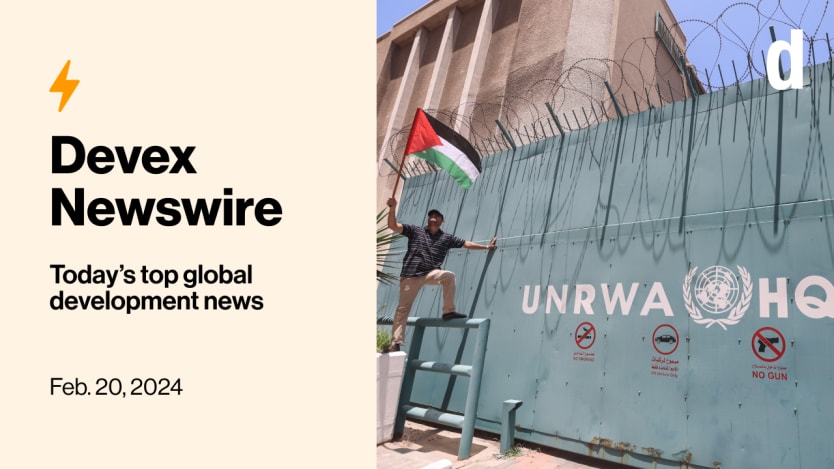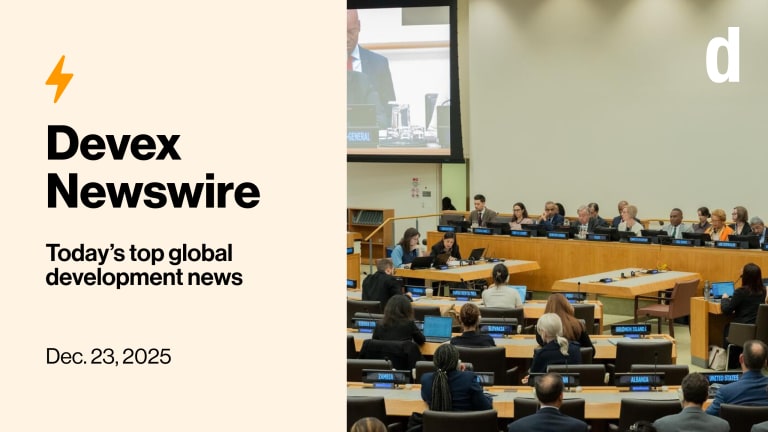
United Nations Secretary-General António Guterres has urged U.N. agencies to avoid actions that could weaken UNRWA’s position, going against the wishes of the United States and Israel.
Also in today’s edition: Africa will pool resources to improve medicine procurement, Germany cuts official development assistance again, and how to get a job with Mercy Corps.
This is a preview of Newswire
Sign up to this newsletter for an inside look at the biggest stories in global development, in your inbox daily.
Some exciting news: Devex is officially on Telegram and WhatsApp! Join our channels to receive updates on the latest global development news directly to your mobile device.
António vs. Joe
U.N. Secretary-General António Guterres has waded further into the kerfuffle of UNRWA funding, asking the heads of the WFP and UNICEF, among its other agencies, to reject appeals by Israel and the U.S. to take on work usually carried out by the beleaguered Palestinian refugee agency.
The outreach pits him against the Biden administration as it mounts a campaign to persuade the U.N.’s main relief organizations to take over some functions of UNRWA after Israel accused the latter of complicity in Hamas’ crimes and many countries paused funding to the group.
Although the U.S. government has underscored the importance of UNRWA, it has pressed other agencies to play a bigger role in delivering assistance in Gaza, amid concerns that Congress will permanently halt hundreds of millions in aid each year to the Palestinian refugees.
“State/USAID [are] very clear that Congress will never fund UNRWA again and are asking UNICEF, WFP and WHO to step in,” one humanitarian relief expert texted Devex Senior Global Reporter Colum Lynch. “Guterres firmly opposes agencies taking over UNRWA functions.”
Guterres has privately urged the heads of U.N. agencies to rally behind UNRWA and not take any steps that could erode its position — no accepting donations or contingency planning for expanding activities in Gaza, and no poaching any of the thousands of Palestinian workers under contract with UNRWA.
In public, Guterres has voiced concern that weakening UNRWA in the midst of one of the world’s worst humanitarian tragedies would worsen the suffering of Palestinian civilians.
“There are 3,000 Gaza staff members that are the backbone of the humanitarian distribution inside Gaza,” Guterres recently told reporters. “No other organization has a meaningful presence inside Gaza.”
Exclusive: US, UN clash over beleaguered Palestinian refugee agency
+ Sign up for a Devex Community account at no charge to unlock free exclusive news.
Community account members can join the special edition of the Devex Leader Roundtable series featuring Black leaders in various sectors of global development, happening tomorrow. Register now. Can’t attend live? Register anyway and we’ll send you a recording.
The Deutsch bank
Germany has sharply reduced aid money since Chancellor Olaf Scholz’s three-party coalition government took power at the end of 2021. And the world’s second-largest donor of official development assistance plans to continue to do so, writes Burton Bollag for Devex.
Sharp cuts in 2023 had already led to €1.7 billion being removed from the development budget and €430 million from the humanitarian budget. For this year, almost €1 billion more was shaved off the foreign development budget and nearly €500 million from the humanitarian aid budget.
German Finance Ministry forecasts show the government expects to make further, similar-sized reductions to foreign aid in 2025. In total, that’s around €4.8 billion shaved off its core development and humanitarian budgets between 2022 and 2025.
Read: How Germany is cutting billions from foreign aid (Pro)
+ A Devex Pro membership gives you access to all our expert analyses, insider insights, career resources, exclusive events, and more. Not a Pro member yet? Start your 15-day free trial today.
AU takes key vote on health
African leaders are still trying to shore up the continent’s health security. They met this weekend for a summit at the African Union headquarters in Ethiopia and a raft of decisions went to a vote.
Crucially, they agreed to create a pooled procurement mechanism for medical commodities, writes Devex Senior Reporter Sara Jerving.
The African medicines and vaccines market is estimated to be $50 billion annually. Still, the continent is a net importer, a deadly problem during the last pandemic when supply chains went haywire and African nations were cut off from receiving supplies or made to pay hefty prices.
Looking toward the future, African leaders have prioritized local manufacturing of medical commodities — and now the AU aims to increase locally produced vaccines from under 1% of what the continent needs to up to 60% by 2040.
But it is no easy feat. Disjointed regulatory systems make it tough for local manufacturers to access the market and manufacturers from China and India, for example, can often sell for cheaper. An African-led pooled procurement mechanism can ensure that an increasing quantity of health commodities are procured from African manufacturers and that these manufacturers can access a continent-wide market rather than just a few countries.
Read: The AU plans to pool resources to unify $50B pharma market (Pro)
Related: Why African pharmaceutical manufacturers struggle for sustainability (Pro)
The deciders
“It seems ironic that whether a program is locally led or not is being decided in Washington. Surely it should be decided in Africa or in Asia?”
— David Ainsworth, business editor, DevexFor the latest edition of our This Week in Global Development podcast, Devex's Raj Kumar sits down with David and with Atlantic Council’s Nicole Goldin to discuss community leaders’ take on USAID’s big localization drive.
Crisis work
Mercy Corps has a global team of nearly 6,000 humanitarians — almost entirely local — working in countries affected by crisis, disaster, poverty, and climate change. It’s not an easy gig and neither is getting a job.
We spoke to Mercy Corp’s Yannah Preta and Kristine Wilson Andrade to get an idea of what the NGO looks for in a top candidate and how to navigate the application process.
“There are a couple of things that we look at regardless of the position that we're recruiting for, and these are soft skills that really translate across different categories of roles,” says Preta, the NGO’s global talent acquisition manager. “One of them is a level of comfortability in working through transition and navigating uncertain situations.”
Read: What Mercy Corps is looking for in top job candidates
In other news
The U.S. has drafted a rival resolution calling for a temporary cease-fire in Gaza after rejecting an Arab-supported resolution demanding an immediate humanitarian cease-fire. [AP]
The conflict in Sudan has displaced almost 700,000 people since it started, yet the crisis has remained largely ignored with only 3.5% of the $2.7 billion requested aid raised so far. [Financial Times]
More than 60 U.K. INGOs have signed an open letter urging members of Parliament and ministers to vote for a cease-fire in Gaza. [ReliefWeb]
Sign up to Newswire for an inside look at the biggest stories in global development.








